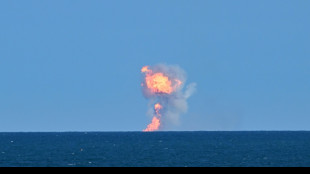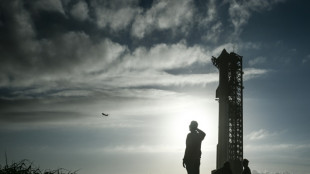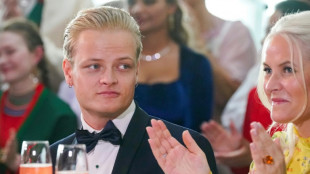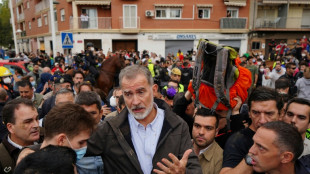
-
 Taliban govt clearing 'un-Islamic' books from Afghanistan shelves
Taliban govt clearing 'un-Islamic' books from Afghanistan shelves
-
Asian markets struggle as traders weigh geopolitical tensions

-
 Iraq holds its first census in nearly 40 years
Iraq holds its first census in nearly 40 years
-
SpaceX fails to repeat Starship booster catch, as Trump watches on

-
 European powers, US seek to censure Iran at UN nuclear watchdog board
European powers, US seek to censure Iran at UN nuclear watchdog board
-
SpaceX fails to repeat Starship booster catch, as Trump looks on

-
 European stocks fall on Ukraine-Russia fears, US focused on earnings
European stocks fall on Ukraine-Russia fears, US focused on earnings
-
Trump names China hawk Howard Lutnick commerce secretary

-
 SpaceX set for Starship's next flight -- with Trump watching
SpaceX set for Starship's next flight -- with Trump watching
-
Top-selling daily French daily Ouest-France stops posting on X

-
 Russian invasion toll on environment $71 billion, Ukraine says
Russian invasion toll on environment $71 billion, Ukraine says
-
New Botswana leader eyes cannabis, sunshine to lift economy

-
 China's Xi urges 'strategic' ties in talks with Germany's Scholz
China's Xi urges 'strategic' ties in talks with Germany's Scholz
-
COP29 negotiators strive for deal after G20 'marching orders'

-
 Walmart lifts full-year forecast after strong Q3
Walmart lifts full-year forecast after strong Q3
-
Son of Norwegian princess arrested on suspicion of rape

-
 US lawmaker accuses Azerbaijan in near 'assault' at COP29
US lawmaker accuses Azerbaijan in near 'assault' at COP29
-
Spain royals to visit flood epicentre after chaotic trip: media

-
 French farmers step up protests against EU-Mercosur deal
French farmers step up protests against EU-Mercosur deal
-
Burst dike leaves Filipino farmers under water

-
 Markets rally after US bounce as Nvidia comes into focus
Markets rally after US bounce as Nvidia comes into focus
-
Crisis-hit Thyssenkrupp books another hefty annual loss

-
 Farmers descend on London to overturn inheritance tax change
Farmers descend on London to overturn inheritance tax change
-
Floods strike thousands of houses in northern Philippines

-
 SpaceX set for Starship's next flight, Trump expected to attend
SpaceX set for Starship's next flight, Trump expected to attend
-
Several children injured in car crash at central China school

-
 Urban mosquito sparks malaria surge in East Africa
Urban mosquito sparks malaria surge in East Africa
-
Many children injured after car crashes at central China school: state media

-
 Asian markets rally after US bounce as Nvidia comes into focus
Asian markets rally after US bounce as Nvidia comes into focus
-
Tens of thousands march in New Zealand Maori rights protest

-
 Five takeaways from the G20 summit in Rio
Five takeaways from the G20 summit in Rio
-
Parts of Great Barrier Reef suffer highest coral mortality on record

-
 Defiant Lebanese harvest olives in the shadow of war
Defiant Lebanese harvest olives in the shadow of war
-
Divided G20 fails to agree on climate, Ukraine

-
 Can the Trump-Musk 'bromance' last?
Can the Trump-Musk 'bromance' last?
-
US to call for Google to sell Chrome browser: report

-
 Trump expected to attend next Starship rocket launch: reports
Trump expected to attend next Starship rocket launch: reports
-
Stocks, dollar hesitant as traders brace for Nvidia earnings

-
 Biden in 'historic' pledge for poor nations ahead of Trump return
Biden in 'historic' pledge for poor nations ahead of Trump return
-
Tropical storm Sara kills four in Honduras and Nicaragua

-
 Spanish resort to ban new holiday flats in 43 neighbourhoods
Spanish resort to ban new holiday flats in 43 neighbourhoods
-
Phone documentary details Afghan women's struggle under Taliban govt

-
 G20 wrestles with wars, 'turbulence' in run-up to Trump
G20 wrestles with wars, 'turbulence' in run-up to Trump
-
Stocks, dollar hesitant as traders eye US rate outlook, Nvidia

-
 G20 wrestles with wars, climate in run-up to Trump
G20 wrestles with wars, climate in run-up to Trump
-
G20 host Brazil launches alliance to end 'scourge' of hunger

-
 Stocks, dollar hesitant as traders scale back US rate cut bets
Stocks, dollar hesitant as traders scale back US rate cut bets
-
Trump confirms plan to use military for mass deportation

-
 UN climate chief at deadlocked COP29: 'Cut the theatrics'
UN climate chief at deadlocked COP29: 'Cut the theatrics'
-
Tractor-driving French farmers protest EU-Mercosur deal


Iraq holds its first census in nearly 40 years
Iraq is holding its first nationwide census in nearly four decades this week, a long-awaited count in a nation that has been blighted by sectarian and ethnic divisions.
The census is scheduled for Wednesday and Thursday, and will provide sorely needed up-to-date demographic data for the country which has an estimated population of around 44 million.
It will be the first census to cover all 18 governorates since 1987, when dictator Saddam Hussein was in power, following repeated delays caused by years of war and political tensions between factions.
"More generally across the country, parliamentary representation will change," said Hamzeh Hadad, a visiting fellow at the European Council on Foreign Relations (ECFR).
With one member of parliament allocated by the constitution per 100,000 Iraqis, "having an official census will mean the numbers will have to be adjusted" based on the new demographic breakdown, he said.
A count conducted in 1997 excluded the three northern provinces that make up the autonomous Kurdistan region.
The upcoming census has reignited tensions between Baghdad and Kurdistan over disputed territories in the north.
The census includes religion but does not differentiate between sects, such as Sunni and Shiite Muslims, and, unlike previous counts, it excludes ethnicity.
"There are some crucial details in this census that might be missing to appease all sides to finally allow it to take place," Hadad added.
Iraq has been keen to conduct the census for budgetary reasons.
Prime Minister Mohammed Shia al-Sudani said the census was important for "development and planning steps in all sectors that contribute to the advancement and progress of Iraq", where electricity is scarce and infrastructure largely in disrepair.
- Two-day curfew -
During the census a two-day curfew will operate, with families having to stay at home so 120,000 researchers can collect data directly from households.
A questionnaire seen by AFP records the number of people per household, health status, education level, employment status, number of cars and even an inventory of household appliances, so standards of living can be assessed.
Iraq has spent much of the past few decades devastated by conflict and sanctions, including a sectarian struggle after the US-led invasion 2003 toppled Saddam and the emergence of the Islamic State group in 2014.
Demographics are likely to have shifted with the exile of hundreds of thousands of Christians, and also of tens of thousands of Yazidi families who were displaced from Sinjar by atrocities committed by IS extremists.
Iraq has regained some semblance of stability in recent years, despite sporadic violence and political turmoil.
To organise the count, authorities partnered with the United Nations Population Fund (UNFPA), in an effort to generate "accurate demographic information, facilitating effective policymaking and promoting inclusive growth".
After years of uncertainty, the census will reveal "the reality of Iraq in its smallest details", said planning ministry spokesman Abdel-Zahra al-Hindawi.
"We will be able to diagnose all the problems that paralyse development in the areas of health, education, housing," he added.
- Demographic shift -
Previous censuses were cancelled mainly because of tensions over disputed territories between the Kurdish, Arab, and Turkoman communities in the northern governorates of Kirkuk and Nineveh.
There is still "a lot of sensitivity over disputed territories", said the ECFR's Hadad.
"It's not just the Arabisation policy under Saddam Hussein. But the reversal of it and Kurdification of disputed territories post-2003. So it's not one-sided."
Fahmi Burhane, a Kurdistan region official focused on the disputed territories, voiced long-standing fears among Kurds about a demographic shift in Kirkuk and other areas claimed by both Baghdad and Arbil.
"If we look at past censuses, the number of Kurds has gradually decreased in the Kurdish regions outside autonomous Kurdistan," he said, referring to the movement of Arabs into areas such as Kirkuk under Saddam.
"Arab neighbourhoods have been built in recent years, which absolutely do not correspond to normal population growth," he said.
In the census, Baghdad has agreed to register only the descendants of families who were present in the disputed territories during the 1957 count, in order to prevent subsequent waves of migration from disrupting the demographic balance. Newcomers will be counted in their province of origin.
Burhane said the Iraqi government has been able to "alleviate certain concerns" over the poll.
Y.Uduike--CPN
